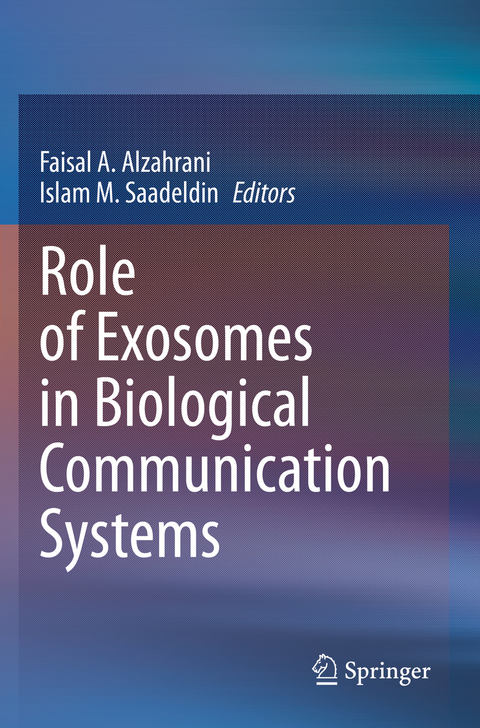
Role of Exosomes in Biological Communication Systems
Springer Verlag, Singapore
978-981-15-6601-1 (ISBN)
Dr. Faisal A. Alzahrani is an Associate Professor of Molecular Biology at King Abdulaziz University. He received his Ph.D. in Medical Sciences from North West Cancer Research Centre at Bangor University, where he studied the mechanisms of genome maintenance in cancer stem cells and stem cells. After that, he joined the university as a faculty member, set up his team and laboratory, and was appointed as deputy head of the stem cell unit. Dr. Alzahrani subsequently focused his research on stem cell-derived exosomes and their therapeutic applications. While working as a visiting lecturer at Aston Medical School in the UK, he became more interested in translating research and joined MirZyme Therapeutics as Vice President for the MENA region. Dr. Islam M. Saadeldin is an Associate Professor at King Saud University, Saudi Arabia and adjunct Associate Professor at Zagazig University, Egypt. He obtained his Ph.D. from Seoul National University, South Korea in2012. He was a visiting scholar at Niigata University, Japan (2008), and also served as a postdoctoral fellow at Seoul National University (2013-2014). He received the Asian Universities Alliance (AUA) Scholar Award in 2019 and a visiting professorship to Seoul National University. He holds a patent for embryo transgenesis through PiggyBac transposons. He has published more than 100 research articles on animal cloning, genome editing, assisted reproductive techniques, adult and embryonic stem cells, as well as the roles of exosomes in pathophysiology and embryonic-maternal crosstalk, in respected journals. He also serves on the editorial boards of Frontiers in Veterinary Science, Journal of Animal Reproduction ad Biotechnology, and Cloning and Transgenesis, and as an associate editor for The Open Stem Cell Journal.
Chapter 1. Isolation and characterization of extracellular vesicles: classical and modern approaches.- Chapter 2. Characterization and fine structure of exosomes.- Chapter 3. Extracellular vesicles mediate the embryonic-maternal paracrine communication.- Chapter 4. The interplay between oviduct-derived exosomes and cumulus-oocyte complexes.- Chapter 5. The interplay between exosomes and spermatozoa.- Chapter 6. Mesenchymal stem cell-derived exosomes and regenerative medicine.- Chapter 7. Therapeutic Potential of Mesenchymal Stem/Stromal Cell Derived-Exosomes.- Chapter 8. Exosomes in Neurodegenerative Disorders.- Chapter 9. Differential expression of exosomal microRNAs in neurodegenerative diseases.- Chapter 10. Urinary exosomes as a possible source of kidney disease biomarkers.- Chapter 11. Extracellular vesicles as potential therapeutic targets and biomarkers for liver disease.- Chapter 12. Implications of extracellular vesicles in blood protozoan parasitic diseases.- Chapter 13.Cancer cells-derived Exosomes and Metastasis.- Chapter 14. Extracellular vesicles and integrins: partners in cancer progression.- Chapter 15. Exosomes: the crucial element in the prostate cancer.- Chapter 16. Exosomal microRNAs: Potential Biomarkers for Cancer Diagnosis, Treatment Response, and Prognosis.- Chapter 17. Exosomes in drug delivery.- Chapter 18. Exosomes and Supported Lipid Layers as Advanced Naturally Derived Drug Delivery Systems.
| Erscheinungsdatum | 29.11.2021 |
|---|---|
| Zusatzinfo | 30 Illustrations, color; 4 Illustrations, black and white; XII, 373 p. 34 illus., 30 illus. in color. |
| Verlagsort | Singapore |
| Sprache | englisch |
| Maße | 155 x 235 mm |
| Themenwelt | Medizin / Pharmazie ► Medizinische Fachgebiete ► Onkologie |
| Studium ► 1. Studienabschnitt (Vorklinik) ► Physiologie | |
| Studium ► Querschnittsbereiche ► Infektiologie / Immunologie | |
| Schlagworte | Exosomal microRNA • exosomes • Infectious Diseases • Paracrine communication • pathophysiology • Regenerative medicine |
| ISBN-10 | 981-15-6601-1 / 9811566011 |
| ISBN-13 | 978-981-15-6601-1 / 9789811566011 |
| Zustand | Neuware |
| Haben Sie eine Frage zum Produkt? |
aus dem Bereich


